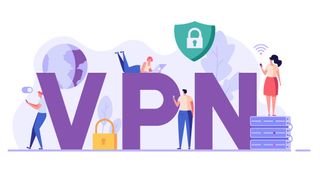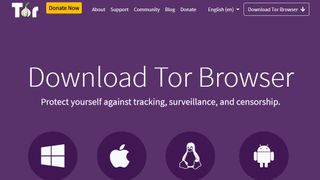9 ways to browse the web anonymously
VPNs, proxy servers, anonymous browsers and more

Every time you browse the web, you leave behind digital traces. These can be what page you visit, what you bought, your personal email address, how long your session lasted, and even the specific location you were connected from.
Marketers might use this information for commercial purposes, while ISPs and governments may access these to surveil your activities. Or, worse, hackers may be able to exploit your data for malicious intents.
Luckily, there are some super simple methods to escape this online control and browse anonymously. And, using security tools like one of the best VPN services is just one of those.
Read on to discover how to secure your anonymity when surfing the web.
How can you be tracked?
Before learning how to browse the web anonymously, you should be aware of how third parties manage to collect data about you and your online activities.
Below, there are the most common tracking tactics:
- IP address tracking: Necessary for accessing the internet, your IP address is a unique set of numbers that determines your physical location. Any website you visit can virtually collect your IP for identifying purposes. As this type of tracking only works if your IP is visible, simply connecting through a secure VPN service will prevent your ISP, third-party companies, government and hackers from snooping on you.
- Account tracking: Your browser account can reveal a lot of information about you - from your personal email address, to bank card details and social media usage. Consider logging out from your browser account if you want to protect your anonymity.
- Tracking cookies: The most common web trackers around, cookies are a tiny snippet of code that gets stored on your browser once you access a website. Some - like billing address and payment methods on ecommerce platforms, for example - are essential to customize your digital profile. Others are used for solely commercial purposes and can be way more intrusive, following your activities even after leaving the website.
- Browser fingerprint: Here, the tracking happens via the unique details linked to the device you are connected from. These include device model, screen resolution, operating system, language, browsing history, and so on. All of this information defines its own browser fingerprint, which can then be used to track down your online activities every time you open the browser.
- Web beacons or pixel tracking: These are single-pixel transparent graphic images that can be attached to websites you visit and emails you open. Similarly to cookies, they record your digital behavior to draw a precise digital profile. As they are invisible to users, your data could be exposed without you even knowing. However, you can prevent the issue by disabling automatic image downloads on your browser.

Private browsing vs anonymous browsing
Even if the two terms sound similar, they aren't.
Are you a pro? Subscribe to our newsletter
Sign up to the TechRadar Pro newsletter to get all the top news, opinion, features and guidance your business needs to succeed!
Private browsing, also known as Incognito mode in Google Chrome, is simply an option you enable on your browser that deletes your browsing history and cookies every time you close the session. It also prevents account tracking as any accounts you're signed in on your browser are not in the private mode.
However, private browsing is not enough to protect your anonymity online as it still exposes your information like your real IP address.
1. Connect with a VPN
A VPN is the perfect tool for avoiding IP address tracking and browsing the web anonymously.
This is because every time you connect to a virtual private network, you are linked to the IP of the VPN server you choose. As many people are connected to the same IP location at the same time, it's virtually impossible to locate your actual geographic position. What's more, all the top services boast a wide array of secure and fast international servers for you to choose from.
However, VPNs cannot secure your anonymity at full. In fact, even when connected with the most private VPN services around, you are still at risk of being tracked via cookies, web beacons and active online accounts.

2. Use a proxy server
Also using one of the best proxy servers will help you to protect your anonymity when surfing the web. Similarly to virtual private networks, the websites you visit together with your ISP will be able to see only the IP address connected to your chosen proxy server.
However, if you are in need of stronger online privacy, VPNs are a better choice, because proxy servers do not encrypt your data in transit. This means that your online information is more at risk of being exposed.
3. Switch to a private browser
As the majority of the web trackers start off from your browser, switching from your data-hungry Google Chrome to one of the best anonymous browsers around is a must if you need to preserve your online privacy and anonymity.
The Tor browser, for example, is your best bet for enhancing your online security - and it's 100% free to use. Working with so-called onion routing, it routes the traffic through at least three servers and encrypts the data each step of the way. However, these extra layers of encryption - even though making your online experience more secure than using a VPN service - might slow down your connection speeds.
Another private browser known for its enhanced security features is Mozilla Firefox. Designed with respect for its users' privacy at its core, on its website it claims to collect "so little data about you, we don’t even require your email address to download.” Plus, other useful security features like tracking protection, ad blocker and even a cryptominer malware blocking will help you browse the web with as few risks as possible.

4. Use an anonymous search engine
Beside switching browsers, you can also opt for using an anonymous search engine instead.
Our favorite at the moment in terms of privacy is probably DuckDuckGo. Even though it's minimalistic compared to its more popular counterparts, it promises not to store any of your personal information ever, nor to allow ads to follow your activities from site to site. It also offers site encryption and automatically warns you before opening a site that you cannot trust. The downside is that the search results are not optimized for you, but that's probably the reason why you want an anonymous search engine in the first place.
Some companies behind the top security software around have now built their own secure search engines. For example, the firm behind one of the cheapest VPN services around, Surfshark, is offering its own Surfshark Search software together with its own VPN, antivirus and data leak detection system with its Surfshark One security package.
5. Download privacy-friendly browser extensions
If you can't be bothered to completely switch browsers, you'll be happy to know that there are a ton of browser extensions out there with the goal of better protecting your online privacy.
From anti-tracking tools and ad-blockers, like Privacy Badger and Ghostery, to password manager and even VPN browser extensions, have a look at your options and take your pick. If you want to keep using Google Chrome, we have a dedicated guide of the best Chrome extensions to help you choose the right package for your needs.

6. Minimize your browser data collection
To boost your online anonymity, you also have the option to customize your browser settings to minimize the data that can be collected about you and your activities.
You can turn off tracking location data, for example. This will prevent your browser from sharing your geolocation details with the websites you visit. Similarly, you can turn off cookie tracking to minimize traffic monitoring and tailored ads to appear on the web pages you open. Also clearing your cache and browsing history is another good way to stay on top of your digital hygiene.
It is worth noting that all these methods are less effective than connecting to the internet via a VPN or Tor browser, for example. Despite this, customizing the settings of your browser is still a valuable tactic to beef up your online anonymity that you can use alongside other security tools.
7. Turn off tailored ads on social media
Spending time on social media is probably one of the main activities of internet users nowadays. That's why it is important to be careful to share as little information as you can on these sites.
While some personal information might be impossible to avoid sharing, there is still something you can do to take some agency back over your data. While social media platforms like Twitter, Facebook and Instagram monitor your traffic to personalize the ads you see, most of these sites have the option for turning off tailored ads too. Even though it looks like a small step, combined with other tactics can make some difference to help you browse the web more anonymously.

8. Secure your online conversations with a private email service
Protecting your online anonymity means also securing all your conversations online. And, besides using an encrypted messaging app like Telegram and WhatsApp, you should also consider switching to a more secure email service.
One of our favorites is the open-source software ProtonMail. From the Swiss-based provider behind one of the top VPNs right now, Proton VPN, it comes with both a free version and some paid plans to choose from. Easy to use, ProtonMail secures your online conversations with strong end-to-end encryption, anonymous email accounts based on a strong no-log policy and some useful security features like the option to send self-destructing emails. ProtonMail is also customized to support Tor as a default browser.
Among other secure email services we recommend are the German Tutanota, Securemyemail and Mailbox.org.
9. Combine different methods
None of the methods mentioned above are 100% bulletproof, so it's a good idea to combine different ways to beef up your online anonymity even further.
For example, you should opt for a reliable torrenting VPN even if you are accessing torrent sites with the Tor browser, as the latter may end up revealing your IP address when downloading malicious files.
Also, as we mentioned before, it's good practice to customize your browser settings to minimize data collection at all times - no matter if you are connected via a proxy server or VPN. Same applies to the use of privacy-friendly browser extensions together with your chosen VPN service.

Chiara is a multimedia journalist committed to covering stories to help promote the rights and denounce the abuses of the digital side of life—wherever cybersecurity, markets and politics tangle up. She mainly writes news, interviews and analysis on data privacy, online censorship, digital rights, cybercrime, and security software, with a special focus on VPNs, for TechRadar Pro, TechRadar and Tom’s Guide. Got a story, tip-off or something tech-interesting to say? Reach out to [email protected]
Most Popular

